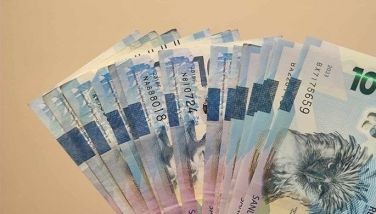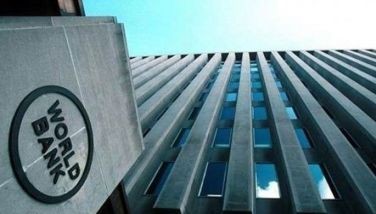Market tumbles 7.62 pts on weak PLDT, SM Prime
December 1, 2005 | 12:00am
The main Philippine stock index declined Wednesday, weighed down by losses in blue chips Philippine Long Distance Telephone Co. (PLDT) and SM Prime.
The benchmark 30-company Philippine Stock Exchange Index fell 7.62 points, or 0.4 percent, to 2,099.74, after shedding 0.1 percent Tuesday.
But selling was not broad-based, with gainers outnumbering decliners 46 to 41, while 51 stocks were unchanged.
First Grade Holdings Managing Director Astro del Castillo said fund managers may have taken into account economic data released by the government Tuesday, showing slower-than-expected third-quarter GDP growth of 4.1 percent, compared to 6.2 percent for the same period last year.
PLDT was the most actively traded stock, giving up 0.6 percent to close at P1,735. Traders said there may still be concern over the impact of the recent resignation of key executives of Smart Communications, its mobile phone unit and main revenue generator.
SM Prime lost 4.7 percent to end at P8.20, possibly on concern over the adverse effect of the recent implementation of the expanded value-added tax on the operations of the Philippines’ largest mall operator.
Sentiment for SM Prime also may have been damped by a slowdown in consumer spending growth and disappointing GDP growth in the third-quarter, traders said.
Tuesday’s data also showed personal consumption expenditure expanded 4.8 percent on year in the third quarter, slower than the 5.5 percent growth in the same quarter of 2004.
The decline in the index was limited by investors continuing to accumulate certain stocks such as Manila Electric B, up 2.2 percent at P23.75, and Ayala Corp., which rose 2.2 percent to P350.
The government yesterday said the economy in the third quarter ended Sept. 30 grew a seasonally adjusted 0.6 percent from the second quarter, slower than the estimates of all five economists in a Bloomberg survey, as industrial production shrank and consumer spending growth eased.
The broader tax will raise P81 billion in additional revenue. The government, which owes P3.89 trillion of debt, started collecting VAT on goods and services on Nov. 1 that were previously exempt, including oil and electricity. It will raise the value-added tax rate to 12 percent from 10 percent in January.
Fitch Ratings signaled on Nov. 24 that it may raise the nation’s junk debt ratings following the introduction of the new value-added taxes. Fitch rates the Philippines’ long-term foreign-currency debt BB, two levels below investment grade. – AP
The benchmark 30-company Philippine Stock Exchange Index fell 7.62 points, or 0.4 percent, to 2,099.74, after shedding 0.1 percent Tuesday.
But selling was not broad-based, with gainers outnumbering decliners 46 to 41, while 51 stocks were unchanged.
First Grade Holdings Managing Director Astro del Castillo said fund managers may have taken into account economic data released by the government Tuesday, showing slower-than-expected third-quarter GDP growth of 4.1 percent, compared to 6.2 percent for the same period last year.
PLDT was the most actively traded stock, giving up 0.6 percent to close at P1,735. Traders said there may still be concern over the impact of the recent resignation of key executives of Smart Communications, its mobile phone unit and main revenue generator.
SM Prime lost 4.7 percent to end at P8.20, possibly on concern over the adverse effect of the recent implementation of the expanded value-added tax on the operations of the Philippines’ largest mall operator.
Sentiment for SM Prime also may have been damped by a slowdown in consumer spending growth and disappointing GDP growth in the third-quarter, traders said.
Tuesday’s data also showed personal consumption expenditure expanded 4.8 percent on year in the third quarter, slower than the 5.5 percent growth in the same quarter of 2004.
The decline in the index was limited by investors continuing to accumulate certain stocks such as Manila Electric B, up 2.2 percent at P23.75, and Ayala Corp., which rose 2.2 percent to P350.
The government yesterday said the economy in the third quarter ended Sept. 30 grew a seasonally adjusted 0.6 percent from the second quarter, slower than the estimates of all five economists in a Bloomberg survey, as industrial production shrank and consumer spending growth eased.
The broader tax will raise P81 billion in additional revenue. The government, which owes P3.89 trillion of debt, started collecting VAT on goods and services on Nov. 1 that were previously exempt, including oil and electricity. It will raise the value-added tax rate to 12 percent from 10 percent in January.
Fitch Ratings signaled on Nov. 24 that it may raise the nation’s junk debt ratings following the introduction of the new value-added taxes. Fitch rates the Philippines’ long-term foreign-currency debt BB, two levels below investment grade. – AP
BrandSpace Articles
<
>
- Latest
- Trending
Trending
Latest























